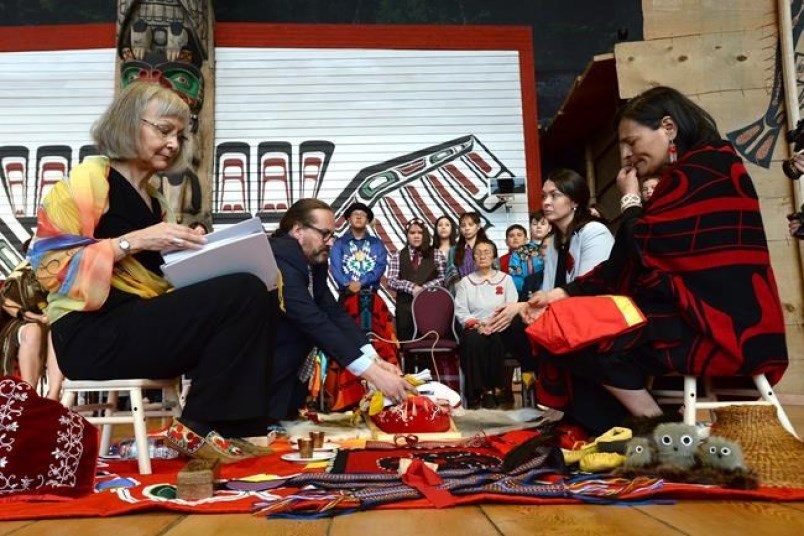The thousands of Indigenous women who were murdered and or went missing over the past several decades in Canada represent a genocide, says the national inquiry into missing and murdered Indigenous women and girls.
On Monday, the inquiry released its final report, saying systemic racial and gendered human rights violations — still happening today — are the cause of thousands of disappearances, murders and violence experienced by Indigenous women, girls, LGBTQ and two-spirited people.
�鶹��ýӳ��is not above the fray — in the 1990s and 2000s, nearly 50 women, many of whom were Indigenous, disappeared from the city’s Downtown Eastside. Robert Pickton was convicted of killing six of those, but many more disappeared and still others are vulnerable today.
Calling for “an absolute paradigm shift,” the report makes recommendations for all sectors of society, but most relevant here are those about education and child welfare and those intended for ordinary Canadians.
Indigenous people have been waiting too long for action and cannot wait any longer, said Kukpi7 Judy Wilson, secretary-treasurer of the Union of B.C. Indian Chiefs.
“We need to address the ‘Canadian Genocide’ — it’s the worst form of discrimination that has continued over hundreds of years and into today with the blatant sexism and racism that is rampant in this country,” Wilson said in a news release.
Prime Minister Justin Trudeau promised to create a national action plan to address violence against Indigenous women and girls. ��
“We have heard of their human rights being consistently and systematically violated,” he told the Inquiry’s closing ceremony. “It is shameful, it is absolutely unacceptable and it must end.”
B.C. Premier John Horgan said his government is committed to change.
"Dismantling the underlying and systemic issues that result in Indigenous women experiencing violence at a much higher rate than non-Indigenous women is fundamental to our government's work toward true and lasting reconciliation,” Horgan said.
Adam Olsen, Green Party MLA and a member of the Tsartlip First Nation, said the report should cause Canadians to take a long, hard look at themselves.
“Not only have these women, girls, two spirit people, and their families suffered greatly, they’ve bravely shared their testimony so that we can better understand what is happening and how to stop it,” Olsen said. “From this point forward, every day we fail to heed their teachings we are complicit.”
To avoid being complicit, what are we to do?
The inquiry has a few ideas.
As well as calling for the national action plan Trudeau agreed to, the report includes dozens of calls to action, including the creation of a National Indigenous and Human Rights Tribunal, independent of government, with authority in all jurisdictions.
There are recommendations about culture, housing, health, justice and other areas, notably education and child welfare.
Teachers from elementary to post-secondary school are encouraged to educate their students about missing and murdered Indigenous women, including the root causes such as residential school, poverty and colonialism. The report encourages educators to teach Indigenous history, law and practices from Indigenous perspectives, with Indigenous people helping to create lesson plans and curriculum.
Also, Indigenous children and youth should be taught about grooming for sexual and other exploitation, the report says.
When it comes to child welfare, the entire system should be transformed, the report finds, to allow for Indigenous self-determination and jurisdiction over a child welfare system that is adequately funded.
“All governments must resolve issues of poverty, inadequate and substandard housing, and lack of financial support for families, and increase food security to ensure that Indigenous families can succeed,” the report says.
In B.C., about 63 per cent of children in foster care are Indigenous, while Indigenous people only make up about five per cent of the total population.
In cases where a child must be taken into care, a relative should be found to look after the child, and they should get the same support a foster parent would get, the report says.
When a child ages out of foster care, there should be a “complete network of support from childhood into adulthood,” including education, housing, and related supports, the report says. It calls for free post-secondary education for all children in care in Canada, a practice already in place at the public post-secondary schools in B.C.
Ordinary Canadians also have a role to play — notably, they can learn about and celebrate Indigenous history and culture. They can hold governments accountable, the report says. Most crucially, they can speak out against racism, sexism, ignorance, homophobia and transphobia whenever they encounter them. It’s the least we can do.
��



